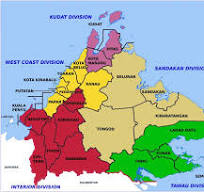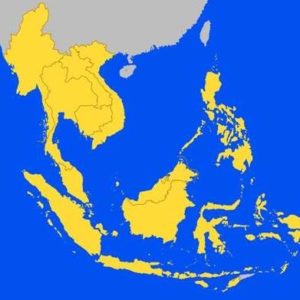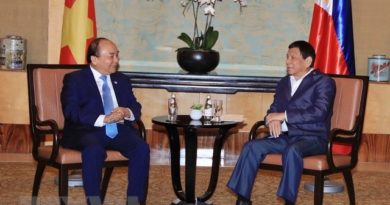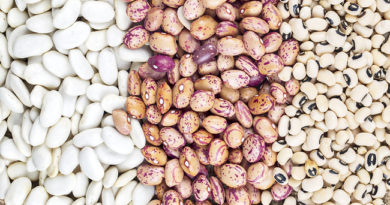WORLD NEWS-COURTS & LAW | NEW YORK: UN General Assembly proper body to tackle Sultanate of Sulu petition – ICJ
Map of Sabah
.
WATCH VIDEO: https://www.youtube.com/watch?v=vkBqNohsWss
History of Sabah – A Philippine own territory or a Malaysian State?
.

Map of the Sultanate of Sulu.Sultanate of Sulu website (ECSeaChamber)
.
.
The International Court of Justice (ICJ) has stated that the Sultanate of Sulu’s petition should be referred to the United Nations General Assembly, the appropriate forum for such cases. This would occur once a member nation such as the United States, China, or the Philippines endorses the petition, as declared by an ICJ official in 2004.
Philippe Couverous, ICJ registrar, in a reply to the Sultanate of Sulu dated 20 October 2024, a copy of which was obtained by Daily Tribune, confirmed that Articles 34 and 35 of the ICJ Statute stipulate that such matters fall under the jurisdiction of the UN General Assembly, not the ICJ.
.
|
|
Abraham Idjirani, spokesperson and convenor of the Mindanao Sulu Unification Movement (MSUM), noted that at least two of the five permanent members of the UN—China and the United States—maintain standing treaties with the Sultanate. The other permanent members are France, the Russian Federation, and the United Kingdom.
Idjirani emphasized that the ICJ response specifically mentions the need for endorsement from a UN member state for the case to proceed to deliberation in the General Assembly.
“This is to inform you of the provisions contained in Articles 35 and 34 of the Statute of the International Court of Justice. The Sultanate of Sulu and North Borneo, or the Bangsa Suluk Nation, just needs one nation to endorse its 2004 petition for deliberation in the UN General Assembly,” Couverous stated.
The 2004 petition, submitted to then UN Secretary-General Kofi Annan, adhered to principles of peaceful settlement and sought the repossession of North Borneo (Sabah) from Malaysia. It also demanded $25 billion in compensation for the use of natural resources in the territory since its annexation in 1963.
However, Idjirani explained that the Sultanate of Sulu had been incapacitated as an international legal entity capable of asserting sovereignty rights. The current ruling family of the Sultanate of Sulu and North Borneo (Bangsa Suluk Nation) now seeks the assistance of the United States government under President Donald Trump to endorse the petition, invoking the 1915 Carpenter-Kiram Agreement.
.
|
|
“The filing of the Sulu Sultanate petition in 2004 with the United Nations was to advance the vital interests, well-being, and general welfare of its constituents and others outside its ancestral realm, including the inhabitants of Sabah,” Idjirani stated.
He explained that the basis of the Sultanate’s claim is rooted in Malaysia inheriting only the British leasehold rights to North Borneo, established by the British North Borneo Company in 1878. These were not sovereign rights, as declared by the late Senator Arturo Tolentino at the United Nations.
Idjirani further stated that the Sultanate plans to seek President Trump’s endorsement for the $25 billion damages suit filed in 2004. The claim arises from Malaysia’s exploitation of Sabah’s natural resources since 1963, despite the Carpenter-Kiram treaty ensuring US protection of the Sultanate’s territorial rights.
The $25 billion claim reflects the estimated value of natural resources exploited since Sabah’s annexation to Malaysia in 1963 up to the present day.
.
|
|
“Since the Philippine government has already opted out of the Sabah case, our only hope is for the US or China to endorse the petition and initiate deliberation at the ICJ,” Idjirani said.
He added that securing President Trump’s endorsement aligns with his administration’s objective of safeguarding vital waterways globally.
Idjirani noted that the Sultanate’s ancestral territory includes parts of the South China Sea and the Celebes Sea, which were key trade routes during the ancient Silk Road era in the 17th century.
The Sultanate’s resolution asserts full sovereign, legal, and historic rights over North Borneo (Sabah) as of 18 September 2004, and demands $25 billion in damages for Malaysia’s alleged illegal exploitation of the territory’s natural resources.
The 2004 petition was anchored on the 1915 Carpenter-Kiram Agreement, the 1947 and 1950 UN Resolutions, and the principles of the 1885 Monroe Doctrine. It was submitted to the UN through its satellite office in Makati, Metro Manila.
.
|
|
The petition was signed by the late Raja Muda Agbimuddin Kiram, supported by followers across the Sulu Archipelago, Zamboanga Peninsula, and Palawan, on behalf of the 33rd Sultan Jamalul Kiram III and the 34th Sultan Esmail Kiram II.
.
|
|
Sultanate of Sulu to seek Trump endorsement of 2004 UN Petition
The Sultanate viewed the UN as the appropriate tribunal to resolve the Sabah dispute with Malaysia through peaceful means, as stated in related UN principles on dispute settlement.
The Philippine government has distanced itself from the Sabah dispute. Solicitor General Menardo Guevarra clarified that the Philippines is not involved in cases between the Sultanate’s heirs and Malaysia.
This stance followed the recent dismissal of a $14.9 billion arbitral award claimed by the Sultanate’s heirs by a French arbitration tribunal.
The tribunal’s dismissal opened the possibility of leasing the resource-rich Sabah territory to countries like China or the Philippines.
“The Philippines is not privy to the case,” Guevarra said, commenting on the latest developments in the territorial dispute.
The Sultanate reiterated its stance that the Sabah claim is separate from the French arbitration award and focuses on its sovereign rights.
The 2004 petition emphasizes peaceful resolution and adherence to UN principles while asserting the Sultanate’s historic and legal claims over Sabah.
.
|
|
TRIVIA
|
|
This article may be too long to read and navigate comfortably. When this tag was added, its readable prose size was 15,300 words. (June 2023)
|
|
Sabah
|
|
|---|---|
|
|
| Nickname(s): | |
| Motto(s): | |
| Anthem: Sabah Tanah Airku[4] Sabah, My Homeland Duration: 1 minute and 3 seconds.
|
|

Sabah in Malaysia
|
|
| Coordinates: 5°15′N 117°0′E | |
| Country | |
| Established under the Bruneian Empire | 15th century |
| Sultanate of Sulu | 1704 |
| British North Borneo | 1882 |
| Japanese occupation | 1942 |
| British crown colony | 15 July 1946 |
| Gained self-governance | 31 August 1963[5][6][7][8] |
| Federated into Malaysia[9] | 16 September 1963[10] |
| Capital (and largest city) |
Kota Kinabalu |
| Divisions |
List
|
| Government | |
| • Type | Parliamentary |
| • Body | Sabah State Legislative Assembly |
| • Yang di-Pertua Negeri | Musa Aman |
| • Chief Minister | Hajiji Noor (GRS–GAGASAN) |
| Area | |
|
• Total
|
73,904 km2 (28,534 sq mi) |
| Highest elevation | 4,095 m (13,435 ft) |
| Population
(2020)[11]
|
|
|
• Total
|
|
| • Density | 46/km2 (120/sq mi) |
| Demonym | Sabahan |
| Demographics [12] [11] | |
| • Ethnic composition |
|
| • Religions |
|
| Languages | |
| • Official | English, Malay |
| • Other spoken | |
| Time zone | UTC+8 (MST[13]) |
| Postal code | |
| Calling code | 087 (Inner District) 088 (Kota Kinabalu & Kudat) 089 (Lahad Datu, Sandakan & Tawau)[16] |
| ISO 3166 code | MY-12 |
| Vehicle registration | SA, SAA, SAB, SAC, SY (West Coast) SB (Beaufort) SD (Lahad Datu) SK (Kudat) SS, SSA, SM (Sandakan) ST, STA, SW (Tawau) SU (Keningau)[17] |
| HDI (2022) | high · 13th |
| GDP (nominal) | 2022 |
| • Total | (RM 122.138 billion)[19] (5th) |
| • Per capita | (RM 36,020)[19] (11th) |
| GDP (PPP) | 2022 |
| • Total | |
| • Per capita | |
| Driving side | Left |
| Electricity voltage | 230 V, 50 Hz |
| Currency | Malaysian ringgit (RM/MYR) |
| Website | Official website |
Sabah (Malay pronunciation: [ˈsabah]) is a state of Malaysia located in northern Borneo, in the region of East Malaysia. Sabah has land borders with the Malaysian state of Sarawak to the southwest and Indonesia‘s North Kalimantan province to the south. The Federal Territory of Labuan is an island just off Sabah’s west coast. Sabah shares maritime borders with Vietnam to the west and the Philippines to the north and east. Kota Kinabalu is the state capital and the economic centre of the state, and the seat of the Sabah State government. Other major towns in Sabah include Sandakan and Tawau. The 2020 census recorded a population of 3,418,785 in the state.[11] It has an equatorial climate with tropical rainforests, abundant with animal and plant species. The state has long mountain ranges on the west side which forms part of the Crocker Range National Park. Kinabatangan River, the second longest river in Malaysia runs through Sabah. The highest point of Sabah, Mount Kinabalu is also the highest point of Malaysia.
The earliest human settlement in Sabah can be traced back to 20,000–30,000 years ago along the Darvel Bay area at the Madai-Baturong caves. The state has had a trading relationship with China starting from the 14th century AD. Sabah came under the influence of the Bruneian Empire in the 14th and 15th centuries. The state was subsequently acquired by the British North Borneo Chartered Company in the 19th century. During World War II, Sabah was occupied by the Japanese for three years. It became a British Crown Colony in 1946. On 31 August 1963, Sabah was granted self-governance by the British. Following this, Sabah became one of the founding members of the Federation of Malaysia (established on 16 September 1963) alongside the Crown Colony of Sarawak, the Colony of Singapore (expelled in 1965), and the Federation of Malaya (Peninsular Malaysia or West Malaysia). The federation was opposed by neighbouring Indonesia, which led to the Indonesia–Malaysia confrontation over three years along with the threats of annexation by the Philippines along with the Sultanate of Sulu, threats which continue to the present day.[20]
Sabah exhibits notable diversity in ethnicity, culture and language. The head of state is the governor, also known as the Yang di-Pertua Negeri, while the head of government is the chief minister and his Cabinet. The government system is closely modelled on the Westminster parliamentary system and has one of the earliest state legislature systems in Malaysia. Sabah is divided into five administrative divisions and 27 districts. Malay is the official language of the state;[21][22] and Islam is the state religion, but other religions may be practised.[23] Sabah is known for its traditional musical instrument, the sompoton. Sabah has abundant natural resources, and its economy is strongly export-oriented. Its primary exports include oil, gas, timber and palm oil. The other major industries are agriculture and ecotourism.
Etymology
The origin of the name Sabah is uncertain, and many theories have arisen.[24] One theory is that when it was part of the Bruneian Sultanate, it was referred to as Saba because of the presence a variety of banana called pisang saba (also known as pisang menurun),[25][26] which are grown widely on the coast of the region and popular in Brunei.[27] The Bajau community referred to it as pisang jaba.[27] While the name Saba also refers to a variety of banana in both Tagalog and Visayan languages. The word in Visayan means “noisy”, which in turn is derived from Sanskrit Sabhā meaning ‘congregation, crowd’ related to ‘noisy mob’.[24] Perhaps due to local dialect, the word Saba has been pronounced as Sabah by the local community.[25] While Brunei was a vassal state of Majapahit, the Old Javanese eulogy of Nagarakretagama described the area in what is now Sabah as Seludang.[5][25]
Although the Chinese since the Han dynasty had been associated with the island of Borneo,[28][29] they did not have any specific names for the area. Instead during the Song dynasty, they referred to the whole island as Po Ni (also pronounced Bo Ni), which is the same name they used to refer to the Sultanate of Brunei at the time.[24] Due to the location of Sabah in relation to Brunei, it has been suggested that Sabah was a Brunei Malay word meaning upstream or “in a northerly direction”.[26][30][31] Another theory suggests that it came from the Malay word sabak which means a place where palm sugar is extracted.[32] Sabah (صباح) is also an Arabic word which means “morning”.
It is nicknamed “Land Below the Wind” (Negeri Di Bawah Bayu in Malay language) as the state lies below the typhoon belt of East Asia and is not often hit by typhoons.[33][34][35]
History
READ MORE: https://en.wikipedia.org/wiki/Sabah
|
|
Perseus Echeminada
Published on:
26 Jan 2025, 10:08








 Memento Maxima Digital Marketing
Memento Maxima Digital Marketing






